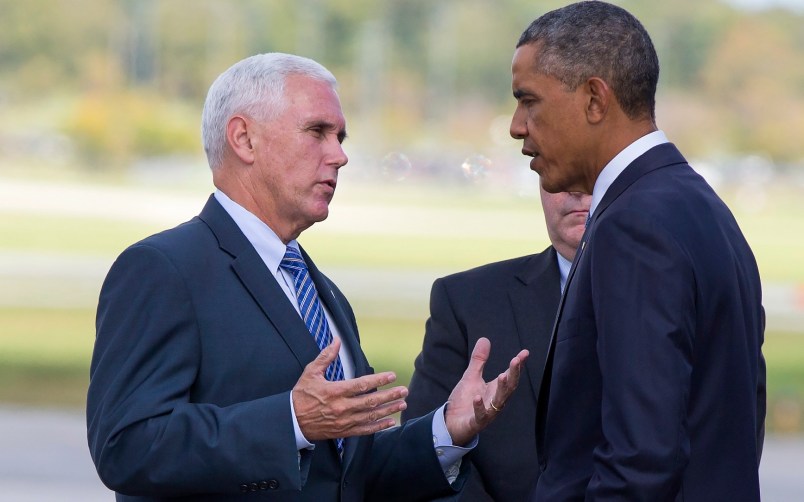Indiana Gov. Mike Pence (R) agreed to expand Medicaid under Obamacare Tuesday, but you’d be forgiven for not catching that if you actually listened to what he had to say.
“I believe Medicaid is not a program we should expand. It’s a program that we should reform,” Pence said. “That’s exactly what we’re accomplishing.”
His office didn’t mention the Affordable Care Act when announcing the plan, which will cover up to 350,000 low-income Indianans. When Pence’s PR team tweeted a timeline of the state program being used to expand Medicaid in that state, they skipped over the 2010 passage of Obamacare. But Pence has accepted Medicaid expansion dollars authorized by Obamacare to pay for this alternative plan — which the Obama administration had to approve.
An Obama administration official had actually primed TPM to be ready for Pence’s semantical theatrics. That’s because it’s become the norm. More Republican-led states are signing onto the key Obamacare program, but they are very reluctant to call it that.
“Republicans are reticent to embrace expansion of entitlement programs, and thus they are quick to avoid calling it Medicaid expansion,” Caroline Pearson, vice president at Avalere Health, an independent consulting firm, told TPM in an email. “They also use branding with other program and waiver names to further distance themselves from the Obamacare Medicaid expansion.”
This might not be surprising. Opposition to the ACA remains a key piece of conservative orthodoxy. But it illustrates, yet again, how difficult it is for the GOP to reconcile that unwavering stance with the reality that millions of their own constituents are benefitting from the law — and millions more stand to in the 20-odd states that still haven’t expanded Medicaid.
But when a conservative-led state crosses that threshold and makes the decision to participate in Medicaid expansion, they go to great lengths to stress how they aren’t actually expanding Medicaid. When Utah. Gov. Gary Herbert first announced that he would seek an alternative expansion plan, he stressed: “I am not recommending an expansion of the federal Medicaid program.”
Or take Tennessee Gov. Bill Haslam when he announced last month that he had crafted an alternative proposal.
“We made the decision in Tennessee nearly two years ago not to expand traditional Medicaid,” Haslam said. “This is an alternative approach that forges a different path and is a unique Tennessee solution. Our approach is responsible and reasonable, and I truly believe that it can be a catalyst to fundamentally changing health care in Tennessee.”
The emphasis is always on the “alternative” and “unique” elements of their expansion plans. To be fair, that’s true. Starting with Arkansas, which proposed using Medicaid dollars to pay for private coverage, states with conservatives in positions of power have pushed the Obama administration to accept a wider and wider range of alternative plans that are more palatable to Republicans.
They’ve branded those plans with names like Healthy Indiana or Healthy Utah. But that doesn’t change the fact that these are proposals authorized under and paid for by Obamacare.
Both buzzwords made it into the announcement by Iowa Gov. Terry Branstad (R) that his office had reached an agreement with the Obama administration.
“This is an Iowa plan that fits the health needs of our state. The Iowa Health and Wellness Plan will improve health outcomes for Iowans,” he said. “I am pleased we reached agreement with the Federal Government on our unique alternative approach and we are ready to move forward to serve Iowans.”
But Pence might have been the boldest yet. His office effectively portrayed his state’s plan as a blow to Medicaid and government-funded health care.
“With this approval, Indiana will end traditional Medicaid for all non-disabled Hoosiers between 19 and 64,” Pence’s office said, “and will continue to offer the first-ever consumer-driven health care plan for a low-income population.”
But despite all of those linguistic gymnastics, astute observers on the conservative side still recognized Pence’s plan, like others before it, for what it was.
“Pence argues that his expansion of Medicaid is actually a victory for market-based principles because of concessions he won from the Obama administration providing the state more flexibility over the implementation of the program,” the Washington Examiner’s Philip Klein wrote on Tuesday. “But this is merely window dressing.”
“Any plan that expands the Medicaid program imposes more costs on taxpayers,” he continued, “expands the federal role in healthcare and should be passionately opposed by those who care about the nation’s future.”







Indianans? It’s Hoosiers.
Republicans will never give President Obama his due just contempt.
Saw the words, “Republican” and “Crazy” and decided to skip the article as it is likely a repeat of last week’s news.
Getting Crazy? I think they fell down that well some time ago.
Mike Pence… ‘‘oh fuck it, lets just join the train wreck.’’
Expansion now almost doesn’t matter. The GOP refused to extend increased Medicaid payments to doctors which were used initially to attract MD participants.
With no extra money for MD’s, newly expanded programs won’t have enough doctors for the people.
The GOP sadists strike again!